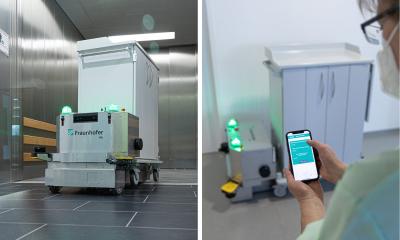News • TPA report
Automation in health care: reduce costs, increase productivity
The Rt Hon Matt Hancock MP, Secretary of State for Health and Social Care, will be launching a new report by the TaxPayers' Alliance (TPA) on introducing more automation in the NHS.
Image by Pete Linforth from Pixabay
As families and businesses face a 50 year high tax burden, the government has a duty to provide good value for money. The NHS is an essential service which needs to see further improvement and less money wasted. Increased funding can only make a difference if this money comes hand in hand with embracing innovation. The TPA's report considers how existing and developing technology can enable the health and social care system to increase productivity, reduce costs, and result in better – world class – health and social care. Over the coming decades the UK will have an ageing population, which will place increased pressure on both health and social care. It is essential that this challenge is addressed, so that high quality health and social care can be provided now and into the future. Increased automation can also help to address staff shortages, as it frees healthcare professionals from more repetitive tasks and allows them to focus on patient care.
Key findings
- The potential value of time released for NHS staff through improved productivity from increased automation is estimated to be £12.5 billion a year.
- The social care sector could similarly save £5.9 billion annually by improved productivity from accelerated automation.
- These combine to give potential annual savings of up to £18.5 billion by 2030.
- The ways these annual savings could be achieved by embracing automation include:
- £1.1 billion in pathology costs
- £75 million on medication for insomnia, depression, and anxiety
- Improved cardiovascular diagnosis delivering savings of £300 million
- Improvements in end of life care that could yield savings of more than £556 million
- The greater use of automated systems to help patients recover better after operations, thereby saving the NHS £100 million.
- There will be an increase from 19 per cent of the population being above the state pension age in 2016 to 23.1 per cent in 2066.
- Public spending on health as a percentage of national income is projected to increase to over 12 per cent of national income by 2067.
- There are barriers to entry into the NHS for companies offering innovative healthcare solutions. Many are being addressed and in the long term it's crucial that the NHS remains open to new ideas and innovation.
- In order to continue to provide world class care now and in the future, the NHS will have to take steps to increase its productivity. Progress is already being made in this regard, but big productivity gains are made when technology is embraced.
Example case studies within the report
- OWise is the first personalised care app for patients with breast cancer. It allows patients to record, in real time, their side effects and overall quality of life, and collates fully anonymised patient-reported data with a view to improving clinical outcomes for cancer. It therefore allows clinicians to tailor care for their patients.
- WaitLess is an app that reduces pressure on A&E by providing patients with real time information on local services and waiting times. It currently has 125,000 users and has resulted in an 11 per cent reduction in minor injuries activity in A&E.
This report is the latest to be released by the TaxPayers' Alliance on AI and technology, and is part of a wider campaign to promote the rapid increase in the automation of public services. Last year the TPA revealed that introducing more automation into the public sector can save taxpayers £17 billion a year.
Commenting on the report, John O'Connell, Chief Executive of the TaxPayers' Alliance said: "British taxpayers people pay for, and deserve, world-leading public services. The Government has committed to making the NHS a major spending priority, but everybody knows that its going to take more than just money to improve health services in this country. The biggest priority should always be striving towards better outcomes for patients, which means freeing up NHS staff from monotonous tasks and giving them more time to spend on real care. Exciting developments in technology could deliver savings for taxpayers - but also, crucially, save more lives."
Health Secretary Matt Hancock said: “I love our NHS because it’s always been there for me and my family, through some of the best moments in life and some of the worst. So my number one priority is making sure it continues to always be there for every family. I care about technology because I care about people. To save and improve lives, technology has huge potential so long as it is properly harnessed by our health and care system. Just as importantly, it has the potential to improve the working lives of health and care staff, freeing them up to do more of what they love and do so well: treating and caring for patients. Automation and innovation are changing the way we live our lives, and can transform the way we deliver public services for decades to come. It is mission critical for all of us who love and cherish our NHS that we seize the opportunities of the future and ensure that modern technology benefits staff, benefits patients and benefits our country as a whole."
Source: TaxPayers' Alliance
24.04.2019





